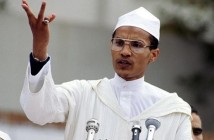 BEIRUT, Lebanon — Moroccans voted in a landslide on Friday to approve constitutional changes proposed last month by King Mohammed VI in a bid to introduce greater political openness and ward off the unrest that has swept the Arab world.
BEIRUT, Lebanon — Moroccans voted in a landslide on Friday to approve constitutional changes proposed last month by King Mohammed VI in a bid to introduce greater political openness and ward off the unrest that has swept the Arab world.
The referendum, promoted by the government as an opportunity to vote for changes to empower the public and reduce the absolute authority of the king, passed with more than 98 percent of the vote, according to preliminary results released early Saturday by the Interior Ministry, Reuters reported.
Under the proposals, the prime minister would no longer be appointed by the king, but would be selected by the majority party in Parliament. An independent judiciary would also be formed.
“If the Arab Spring is to be credited with anything, it is that it helped us realize we should not slow the pace of reform,” said Ahmed Herzenni, a former political prisoner and now an ally of the king, who helped to write the referendum. “I feel like we are on the eve of a second independence.”
Sweltering heat kept most voters away from polling stations — about 40,000 of them across the relatively stable kingdom in the northwestern corner of Africa — early in the day, though voting picked up later. The Interior Ministry estimated that turnout exceeded 70 percent, a significant figure for a nation with weak political parties and widespread illiteracy.
The lopsided results had been widely expected, after the referendum received a strong push by the authorities, most political parties and the nation’s news media.
But while the king and his supporters painted the referendum as a step toward democracy and political freedom, protesters who have been pushing for an end to the king’s monopoly on power said it was a smoke screen designed to preserve the monarchy’s authority.
“I voted no because I don’t believe that anything will change,” said Abdejalil Goutay, a plumber from Marrakesh, in southwestern Morocco. “What concerns me most is corruption, and nothing has been done to fight it.”
Some analysts said that although the reforms would designate the prime minister as “president of the government,” they would fall short of creating a true constitutional monarchy, leaving the king as the head of state with absolute control over the military and all religious matters.
“The king is still going to be the central political figure, and he continues to hold most powers,” said Lise Storm, a senior lecturer at the University of Exeter, in England, who specializes in Middle Eastern affairs. “I find the idea of a very strong yes vote depressing, as it would demonstrate a lot of good will towards the king, and he does not need to be strengthened.”
There were calls to boycott the vote. Hundreds marched against the proposals on Thursday in Fez, according to a video posted online.
Morocco, located at the western edge of a region in revolt, has not escaped the demands for change that have rolled through the Middle East and North Africa. Protesters have held rallies in major cities, organized first on Facebook by the February 20 Movement for Change. The king, who is 47 and has been in power since 1999, is widely considered to be a less rigid ruler than his father, King Hassan II.
The referendum was seen by many as a pre-emptive measure against the widespread protests and unrest in other Arab countries, and as a recognition of the demands and expectations of Moroccans no longer satisfied to be ruled from above.
Among its provisions, the constitutional revisions would make Berber — a minority language in Morocco — an official language alongside Arabic, and would explicitly grant the government executive powers. Government ministers, ambassadors and provincial governors would be appointed by the prime minister, though still subject to the approval of the king.
Despite some criticism of the reforms as window dressing, many Moroccans saw the referendum as a positive step. “This is just a beginning,” a voter who identified himself only as Mehdi said at a polling station in Casablanca. “I hope that parties will be mature enough and come up with solid political and social-economical programs.”
Nada Bakri reported from Beirut, and J. David Goodman from New York. Aida Alami contributed reporting from Casablanca, Morocco.
http://www.nytimes.com/2011/07/02/world/africa/02morocco.html






